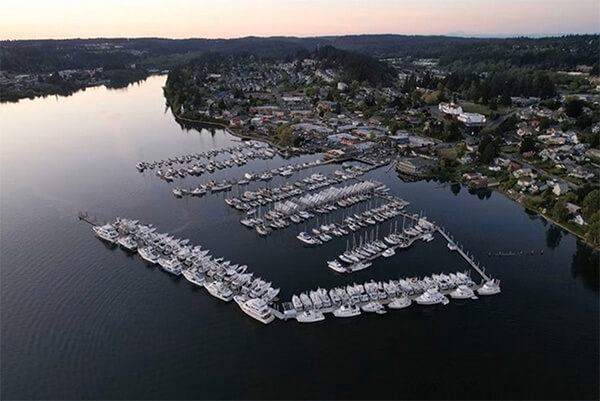This month’s column focuses on a port district’s role as a residential landlord and the impact of COVID-19. Before you skip this column with the belief that your port district has no residential tenants, read on and think again because liveaboard moorage tenants and guests in a port RV park can become a port district’s residential tenants. For years, the best practice considers complying with applicable residential tenant law when evicting liveaboards.
The Washington Residential Landlord Tenant Act (chapter 59.18 RCW). This RCW provides specific notice and court filing procedures landlords must follow to evict residential tenants using the “unlawful detainer” process. The unlawful detainer process is the expedited process that ultimately results in the county sheriff evicting a nonpaying tenant. Recent court rulings have expanded the definition of a “home” to include a vehicle parked on a public street (King County) and a tent on public property (Clark County).
As the housing problem expands in Washington our courts have taken an expansive view of what is a “home”. Therefore, it is safe to assume that a liveaboard boat or a recreational vehicle on a port owned street or in a port owned RV park may be construed as a “home”. Now, more than ever, the best practice is to always ask “Could this boat or RV be claimed as a home?” If the answer may be “yes”, then a careful legal approach is warranted.
Governor Inslee’s Proclamation 20-9. Proclamation 20-19 issued by Governor Inslee in mid-March and recently extended to October 15, 2020 prohibits any action to evict a residential tenant, assess any late fees, or “treating any unpaid rent or other charges” as an enforceable debt or obligation where such non-payment was as a result of the COVID-19 outbreak and occurred on or after February 29, 2020.
The bottom line is that port districts, like other residential landlords, are precluded from collecting past due moorage or RV charges or taking other actions to evict a “residential tenant” post February 29, 2020. Indeed, port districts need to also tread carefully with actions to tow or remove people living in vehicles on port streets. As the courts expand the definition of “home,” does the legal protections afforded to the occupants of the home.
RCW 53.08.320 and RCW 79.100.040 et. seq. Marina operators know that RCW 53.08.320 allows a port district to adopt rules allowing the chaining and seizing of vessels, their removal and storage and their eventual sale for the charges incurred. This statue provides for a process whereby the boat is seized, notice is provided, and ultimately the boat is sold to pay the port charges. If the boat is auctioned with no bidders, the port district owns the boat.
In addition, chapter 79.100 RCW has a broader application to all aquatic lands within a port district, but for the purposes of our discussion, we focus on boats in marinas. RCW 79.100.030 allows a port district to “store, strip, use, auction, sell, salvage, scrap, or dispose of” an abandoned boat found in its marina. The definition of “abandoned”[1] includes a boat that has been moored in a marina in violation of the rules (such as paying rent) for 30 consecutive days or a total of 90 days in any 365-day period. This statute also provides for a process where the notice is first provided and then a boat is seized by the port district.
The Interface Between Port Statutes and a “Home”. Interface of the port statutes and protections for homeowners requires careful analysis because the use of these statutes against someone’s “home” may violate rights, a statutory protection of the “homestead”, and constitutional rights related to searches and seizures of a “home”. Think of the issues that arise if someone’s “home” was seized, sold, or destroyed by a port district.
Consider the Following Actions: There are several actions port districts may consider implementing now to avoid these problems in the future.
-
Educate port staff about the application of Proclamation 20-19. The Proclamation will apply at least through October 15, 2020.
-
Adopt clear liveaboard rules for marinas and clear RV park rules that require boaters or campers to clearly identify that they are using their boat or RV as a “home”. Most ports limit the number of liveaboards allowed and require liveaboards to be so designated by the harbormaster. Marina and RV regulations should provide that unless designated by the port, a boat owner or RV owner is precluded from living in their vessel/vehicle.
-
Take steps to immediately address derelict or near derelict vessels/vehicles in port marinas or RV parks. Inspection procedures and insurance requirements should be observed. Experience shows that these derelict or near derelict vessels/vehicles are the ones that end up being “homes”.[2]
-
Preclude marina and RV tenants from “renting” their boat or RV as residence to anyone.
-
Develop a process to identify potential “homes” and seek guidance from port legal counsel before acting. The only thing worse than having a non-paying customer is evicting that customer and then being sued for violating their rights to live in their home.
This issue is not going away, and it is growing. Where else can someone rent a home with power, water, and a nearby shower for under $1,000 a month? As always, please contact your port counsel with any questions regarding this topic. If you have a particular question or topic for a Knowing the Waters, please e-mail me at fchmelik@chmelik.com.
[1] Chapter 79.100 RCW also applies to “derelict vessels”, but that discussion is left for another column.
[2] One port did a study and found the problem was most acute for boats under 32 feet.





